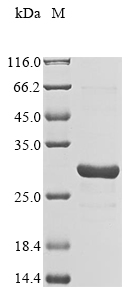Recombinant Human F-box only protein 48 (FBXO48) is expressed in E. coli, spanning the complete protein sequence from amino acids 1-155. The construct includes an N-terminal 10xHis tag and a C-terminal Myc tag, which streamline purification and detection processes. SDS-PAGE analysis confirms the protein achieves greater than 90% purity, suggesting strong reliability for research applications. This protein is strictly for research use and should not be applied for diagnostic or therapeutic purposes.
FBXO48 belongs to the F-box protein family, which appears to play a crucial role in the ubiquitin-proteasome system. These F-box proteins act as essential components of the SCF (SKP1-Cullin-F-box) complex, where they function as substrate recognition units. Through its role in protein degradation, FBXO48 likely contributes to cellular processes including cell cycle regulation and signal transduction. This makes it a compelling target for researchers studying cellular homeostasis and related pathways.
Potential Applications
Note: The applications listed below are based on what we know about this protein's biological functions, published research, and experience from experts in the field. However, we haven't fully tested all of these applications ourselves yet. We'd recommend running some preliminary tests first to make sure they work for your specific research goals.
Human FBXO48 is an F-box protein that requires precise folding and proper integration into the SKP1-CUL1-F-box protein (SCF) complex for its ubiquitin ligase activity. The E. coli expression system cannot provide the necessary eukaryotic post-translational modifications and chaperone systems required for this complex protein. The dual N-terminal 10xHis-tag and C-terminal Myc-tag may sterically interfere with the protein's functional domains and complex formation interfaces. While the protein may be soluble, it is highly unlikely to achieve the correct folding needed for functional activity in ubiquitin ligase complexes.
1. Antibody Development and Validation
This recombinant FBXO48 serves as an excellent immunogen for generating antibodies against linear epitopes of human FBXO48. The full-length sequence ensures comprehensive epitope coverage. The dual tags facilitate purification and provide additional epitopes for screening. However, antibodies may not efficiently recognize conformational epitopes on the native, properly folded FBXO48 in cellular contexts.
2. Biochemical Characterization and Stability Studies
This is the essential first step to assess the protein's physical properties. Techniques like size-exclusion chromatography can determine oligomeric state, while circular dichroism can analyze secondary structure content and thermal stability. These studies provide critical quality control data but characterize this protein itself, not native FBXO48.
3. ELISA-Based Quantitative Assays
This protein is well-suited as a standard for quantitative ELISA to detect immunoreactive FBXO48 levels. The assay depends on antibody binding to linear epitopes, so the protein's folding state is less critical. The dual tags enable flexible immobilization and detection strategies for reliable standard curve generation.
Final Recommendation & Action Plan
The E. coli expression system is fundamentally unsuitable for producing a functional version of this complex F-box protein, limiting its applications to non-functional uses. The immediate priority is Application 2 (Biochemical Characterization) to assess the protein's physical properties through SEC and CD spectroscopy. Applications 1 and 3 (Antibody Development and ELISA) can proceed immediately. F-box protein interactions require precise tertiary structure and complex formation capabilities that this bacterially expressed FBXO48 cannot provide. For functional FBXO48 studies, use mammalian expression systems that support proper complex formation and post-translational modifications.






